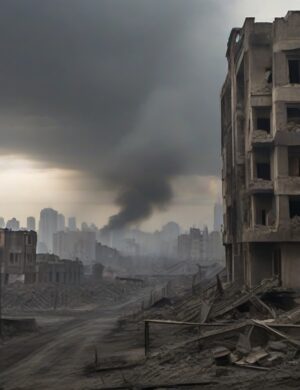Tensions are reaching a critical point in the Middle East, signalling what could be the beginning of a broader global conflict. Israeli intelligence reports suggest that an anticipated Iranian attack could occur within the next few days, marking a significant escalation in a region already fraught with instability. The third world war has been continually conducted as an economic war and through proxies, but is slowly reaching a stage when the primary players who are conducting this conflict will assume their principal roles.
This Iranian strike either directly or through its many proxies, is expected as retribution for the recent killings of senior commanders from Hamas and Hezbollah—both backed by Iran and could ignite a chain of events with far-reaching consequences, potentially drawing in global powers and pushing the world closer to a third world war.
Israel, bracing for the potential assault, has elevated its military to its highest alert level. The United States shares these concerns, with National Security Council spokesperson John Kirby indicating that an attack by Iran or its proxy groups could happen this week. In response, the US is deploying a guided missile submarine and other naval assets to the region, signalling its readiness to engage if deterrence fails. However, this move risks leaving the Pacific vulnerable, a concern that could embolden China at a time when global tensions are already high. Xi Jinping and the PLA have been itching to take Taiwan for decades, and now that the USA is at its weakest point under lame-duck president Biden is possibly the best time to attack.
The situation is further complicated by the ongoing conflict in Ukraine, where recent Ukrainian incursions into Russian territory have added another layer of instability. As Russia becomes increasingly embroiled in its war with Ukraine, its alliances with countries like Iran and Syria are also being tested, potentially leading to a broader alignment of powers against Western interests. The escalation in the Middle East could serve as a flashpoint, drawing in nations already involved in other conflicts, such as Russia’s involvement in Ukraine, and possibly leading to a more widespread, global confrontation.
For weeks, international efforts have been made to dissuade Iran from following through with its strike against Israel. The UK, France, and Germany issued a joint statement warning that any retaliation would be detrimental to regional security. Initially, this pressure seemed effective, but recent reports suggest Tehran, under Supreme Leader Ali Khamenei, is not backing down.
Within Iran, there are internal debates, with newly-elected President Masoud Pezeshkian reportedly advising caution, fearing that a conflict could destabilise his presidency and exacerbate domestic issues.
Iran’s approach to conflict appears to be shifting. Traditionally, Iran has engaged in indirect confrontations with Israel through proxy militias like Hezbollah, avoiding direct military conflict. However, recent rhetoric from Tehran suggests a growing appetite for risk and a potential shift toward direct engagement. This change could have been influenced by a miscalculation during a missile barrage toward Israel in April, which rather than deterring Israel, may have only escalated tensions further.
The Pentagon’s decision to announce the deployment of additional naval forces to the Middle East is a clear attempt to deter Iran from escalating the situation. However, this strategy comes with significant risks.
Moving these assets from the Pacific to the Middle East leaves other regions vulnerable, particularly at a time when China’s assertiveness in the South China Sea is raising alarms.
Defence analysts warn that this could signal to China and other adversaries that the US may be stretched too thin to adequately cover all global theatres of potential conflict.
As the situation in the Middle East continues to escalate, the world stands on the brink of a broader conflict.
The intertwining of regional tensions, such as Iran’s potential strike on Israel, with the ongoing war in Ukraine, sets the stage for a dangerous escalation that could spiral into a global confrontation. The actions of the coming days and weeks will be critical in determining whether these regional conflicts can be contained, or if they will spark the flames of a more direct and involved third world war.








Iran is gonna build nukes soon and then Israel is screwed.
Bull cr@p this is all BS and f-a-k-e news. The Daily Squib is all BS
I hope the Ukrainians move further into Putin Land.
.Putin will consider dropping a tactical nuke on Ukraine. I am not sure if NATO will respond.
The Russians will use a minimal payload tactical nuke on Kiev or some other strategic zone.